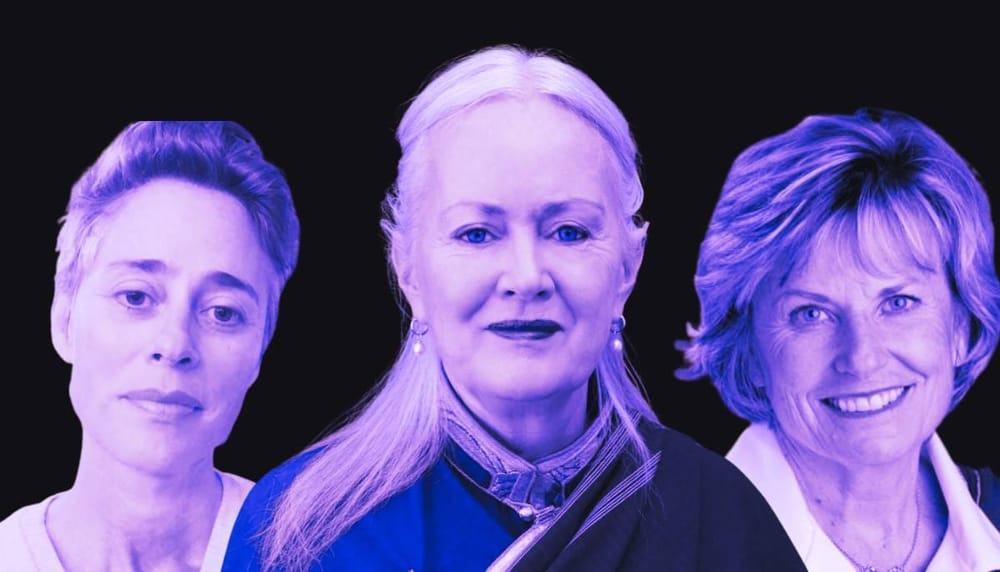
Lama Tsultrim Allione studied extensively with Chogyam Trungpa, taught at Naropa and worked for Shambhala International. She was one of Allen Ginsberg's first meditation instructors. Former staff accuse her of narcissistic abuse, creating a highly demanding and degrading work environment, and covering up physical and sexual abuse.
- PART I: In Pema Chodron's Shadow
- PART II: Inside Reggie Ray's Crestone Cult
Be Scofield is a prominent cult reporter who exposed Love Has Won, which led to the hit HBO series. She is the author of Hunting Lucifer: One Reporter's Search for Cults and Demons. Her work is cited by the NY Times, Rolling Stone, People, and more. It was also turned into an episode of "Unwell" on Netflix.
By BE SCOFIELD
9/17/25
Rachel (a pseudonym) was 19 when she arrived at Tara Mandala, a Buddhist retreat center tucked in the rugged mountains 45 minutes from Pagosa Springs, Colorado. Drawn by a yearning for spiritual purpose, she had deferred college to serve as the personal attendant to Lama Tsultrim Allione, the center’s revered founder.
“I took vows and thought I wanted to be a Tibetan scholar,” Rachel said in an interview. “I felt connected to the people and found belonging in the community.”
But the idealism that brought her to Tara Mandala soon began to unravel.
One day, Rachel found Clara (a pseudonym), a long-term staff member and nun, weeping alone in the temple. “I walked over and put my hand on her back,” Rachel recalled. When she asked what was wrong, Clara sobbed, “I hate myself; I hate my life.”
Then, suddenly, Clara intensely grabbed Rachel’s whole body, pulling her in. “She very forcefully held me,” Rachel said. “And then she puts her mouth on my breast and makes this suction noise.” Rachel froze in shock. Clara got up and walked away without a word.
The next day, Rachel confronted her. “What you did to me yesterday was not okay,” she said. “Clara looks at me dead in the eyes and says, ‘You and I have the same karma,’” Rachel recalled. “Her eyes turned black."
According to Rachel, Tsultrim Allione had convinced Clara she had engaged in sexual misconduct in previous lives. Clara believed her only way to purify her karma was to serve Allione. “Clara told me I also had sexual misconduct in past lives,” Rachel said. “She said I had to repay it.”
Eliza (pseudonym), a former staff member who worked in the office for several years, witnessed Clara’s devotion. She described to me Clara’s work ethic at Tara Mandala as “fanatical.” “She wouldn’t stop,” Eliza said.
Rachel reported the assault to Allione, who arranged a meeting with Debra Quayle Travis, an in-house psychotherapist and Allione devotee. At the meeting, Clara claimed to have no memory of the incident. Quayle’s response stunned Rachel: “The breast is a symbol of the mother’s love, so we’ll just say this wasn’t sexual.”
To her dismay, Allione then moved Rachel into the temple to live with Clara. The two shared a two-bedroom space. Clara’s constant rants about Rachel’s karmic debt and obligation to Allione became inescapable. “Clara unrelentingly talked about how indebted I was to Tsultrim and how I had sexual misconduct in previous lives,” Rachel said.
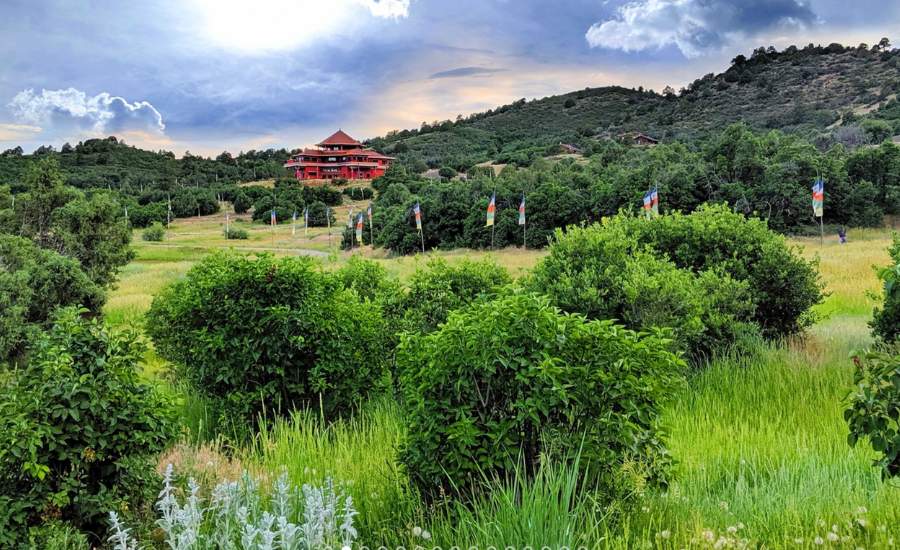
At the time Clara thought it was “weird” that Allione would move a 19-year-old in with a woman who had just assaulted her. But she believed Allione was an enlightened being and wanted to serve her guru to the best of her ability.
When Rachel emailed the Tara Mandala board about the sexual abuse incident, she said they denied and deflected. At the time, one of the board members was Allione’s son, Costanzo. His wife, Cady Allione, then on the executive council, is now the center’s executive director.
“Tsultrim would always say I was projecting when I brought up an issue,” Rachel told me.
In a podcast interview, Chandra Easton, the senior-most teacher in Allione’s lineage, recounted how a Tibetan Lama once groped her by grabbing her breast. She described it as “abusive behavior” and said she nearly “left the dharma” after the turmoil that followed. Easton—who thus has firsthand experience with sexual abuse in a spiritual context—currently serves on Tara Mandala’s board of directors.
Rachel was required to work 12–16 hours a day, seven days a week, serving Allione’s every need—for no pay. “She was highly demanding and particular, but it was thought of as an honor to serve her,” Rachel said. “I’d get long chain emails of all the demands of the day and the moment. I was writing her books and doing her taxes—things as a 19-year-old I didn’t know. Her water needed to be in a perfect position; the teacup had to be pointing towards her in a specific direction.”
During Christmas break, Allione was teaching in the Bay Area near where Rachel was visiting family. “She made me leave my family at Christmas to deliver to her a very specific type of eyeliner,” Rachel said. She drove to a department store, bought the brand, and then drove from Oakland to Marin to hand-deliver it. “That’s when my family got worried,” she said.
Rachel was also required to spend two weeks in solitary retreat in a remote cabin in the Colorado mountains during deep winter. “That was very psychologically challenging to be alone without social contact,” she said.
From the start, Rachel’s days were consumed with intensive spiritual practices. “Clara would wake me up at 5 a.m., and we’d do four hours of practice in the morning and hours at night. We also did Ngondro,” she said. She also practiced Chöd, a Tibetan ritual involving visualizing herself cutting off her head and feeding her body to demons.
“Tsultrim was showing up in my dreams,” Rachel said. “She was guiding me how to detach from my body. I’d wake up to my whole body vibrating and shaking. It felt like there were demons eating my body.” The moment Allione’s grandson was born, Rachel had what she described as a “visceral” dream. “I saw the baby coming, surrounded by white light coming towards my face.”
By then, the idealistic 19-year-old who had arrived in June 2011 had dissolved into the demanding spiritual world of Tsultrim Allione. As her personal servant, her sense of self was disappearing. “I was talking to Tsultrim about having a day or two off, maybe on the weekends, and she was not ok with that,” Rachel said.

By March 2012, nine months in, Rachel was in serious despair. The unforgiving schedule, the spiritual gaslighting of her experiences, and being forced to live with the woman who had assaulted her led to a mental breakdown.
“My brain kind of exploded,” she said. “I was feeling really overwhelmed. I didn’t know who I was anymore.” Her lifeline was a Buddhist therapist in Durango she saw regularly. “She was skeptical of my devotion to Tsultrim,” Rachel said. “She was reality checking me.”
“One day in therapy I lifted my shirt up and showed her my stomach,” Rachel said. The therapist’s eyes widened: Rachel’s belly was crisscrossed with cuts. “I had been cutting myself for months to connect with reality,” Rachel told me. The therapist’s response was immediate and serious: “Oh, we have to get you out of there right away.”
A Pattern of Abuse
In interviews, several former staff and volunteers described experiences that closely echo Rachel’s account—exhausting schedules, coercive control, and punitive responses to dissent. They also recounted witnessing Allione berating and humiliating senior staff behind closed doors—in specific detail. Many of those subjected to abuse are too afraid to speak out, even anonymously, however.
Kara (pseudonym), a former staff member, described the center as a "highly dysfunctional" organization. “Tsultrim is definitely narcissistic, and there was manipulation happening,” Kara said. “I could see the way in which she would navigate getting her needs met.”
Ex-staff member Eliza had a similar take. “I saw people struggling there,” she told me. “I was aware of how hard people were worked. It was a place that pushed your boundaries. I did see people that were unhappy.”
Eliza also described a breach of trust. After asking Allione for guidance on structuring a two-week solitary retreat to discern whether to remain at Tara Mandala, she says her confidential inquiry was shared with senior staff. Soon after, Eliza was dismissed, losing both housing and income. “She broke my confidence,” Eliza said.
Another former member said they observed several abusive situations, including people desperately in need of psychological help, one person who developed an eating disorder while there, and people being pressured into taking vows to participate in complex group rituals. They said some people had breakdowns.
A former staff member told me donations would be earmarked for certain projects, and Allione would use them for anything she wanted at the center. A volunteer described how Allione would play favoritism, giving some people many chances for egregious behavior while kicking others out for minor offenses.
A woman who was deeply involved for many years described Allione's patterns of abuse. “She’d charm you,” Kathy (a pseudonym) said. “She was very charming and manipulative.” She described a familiar cycle: being drawn in, feeling seen and validated, and then—very quickly—facing criticism and judgment.
"A hierarchy is created," she said. According to Kathy, Allione routinely sorted people into moral and spiritual tiers, often declaring, "These people are healthy; these people are not." People’s well-being and "evolution" were constantly ranked, creating in-groups and out-groups supposedly based on dharma practice and "healthiness." She said, “In practice, it often lined up with who had money and favor."
If anyone questioned the system, they were labeled unhealthy—or even psychotic—and then gaslit. "People would scramble to figure out how to look 'healthier,'" Kathy said.
When she brought her concerns to Allione and the leadership, she was rebuffed. “I was explaining how I felt like people were being treated poorly, and so they called a meeting, and they screamed at me for an hour," Kathy recalled.
"They told me I betrayed Tara Mandala for even thinking this way," she told me. Kathy said Allione's husband, David Petit, told her, "If you're not with us, you're against us." At the end of the meeting, Allione told her she wasn't "doing the practices properly" and that she had "a lot of darkness in her."
"It messed me up for a few years," Kathy told me.
"People were not being paid for the work they were putting in," she recalled. "Working long hours, far too much. People were feeling unsupported and burned out, and they were told they were unstable. So people thought they needed to work harder and prove themselves more. They felt like they were losing their mind."
"They called a meeting, and they screamed at me for an hour."
Kathy explained how Aillione would intervene in her follower's therapy. “The way everybody was treated was terrible, but the nuns didn’t have resources to leave.” Kathy said she took in a nun for a few days. "She was losing her mind, saying, 'Maybe Tsultrim is right; maybe I do have darkness and am cursed.'" The nun started psychotherapy with Allione's friend in Taos. "Everything she told the therapist, the therapist told Tsultrim," Kathy said. "It wasn’t a safe space to talk about anything."
There was one instance where Allione was forced to apologize by a prominent Tibetan lama. "She abused a number of nuns, and the lama was very upset about it," Kathy said. "He forced Tsultrim to make a public apology at his retreat. He then stopped coming to Tara Mandala because he couldn't support her behavior."
Kathy witnessed Allione belittle the staff. "One woman had such a panic attack she had to go to the hospital," she told me. "They corner you, say you have darkness in you, and flip things around." On another occasion, Allione had badly manipulated a very gracious donor. Allione's husband, David, abused her. "David went full out in rage on her, screaming at her. It was so abusive and destructive." A different staff member was "run ragged and twisted in every way you can imagine," Kathy said.
 The Guru MagazineBe Scofield
The Guru MagazineBe Scofield
“Worked Down to a Bloody Pulp”
Sofia May first discovered Tsultrim Allione at 18 and began volunteering at Tara Mandala the following summer. For the next four summers, she returned to the remote Buddhist retreat center high in the mountains near Pagosa Springs, Colorado.
“It was 800 acres of untouched wilderness,” she told me. “I was completely enchanted by the nature.” The community, she said, “felt like a family.”
After graduating from Naropa University in 2012, Sofia jumped at the chance to become Allione’s personal attendant, replacing the departing Rachel, who had left Tara Mandala traumatized after her therapist intervened to remove her. “I was a part of that community for seven years,” Sofia said. She would spend the next two and a half of them serving Allione full time.
Sofia described the work environment as chaotic and dehumanizing. “Allione was an abusive narcissist,” she said. “The staff was worked down to a bloody pulp. Everybody was exhausted and strung out. I saw staff members crying on a somewhat regular basis.”
One incident seared itself into her memory. Volunteers, unpaid, had worked so hard with jackhammers to install flagpoles that their knuckles were bloody and cracked. When they asked for a break, Allione snapped, “This is not a democracy. This is what you are here for.”
“These people weren’t being paid but were expected to do excruciating manual labor to earn their meals,” Sofia said. “Some would be there for two days and get out of there.”
Like Rachel before her, Sofia worked 12–16 hour days, seven days a week. “I was expected to work from dawn until sometimes past midnight,” she said. “For the first six months I wasn’t allowed to have meal breaks. I asked Tsultrim if I could go to lunch, and she got angry and denied me.”
The exhaustion was crushing. “I told her I was weak. I told her I was hitting a wall,” Sofia recalled. Allione replied coldly, "Then walk through it.”
“She expected I never stop,” Sofia said. “I had to be at her beck and call from 7 a.m. until she went to sleep at night or until she wanted to be alone around 10 p.m. I wasn’t allowed to take days off either. If I asked for a day off, I’d be met with an ice-cold fury. She’d tell me, ‘You need to walk through your wall of exhaustion.’”

When Sofia inevitably got sick from the relentless schedule, it only enraged Allione. “Tsultrim was furious with me when I got sick because I couldn’t serve her,” Sofia said. “If she has to pour water herself, then I’m affecting her ability to serve sentient beings. I was blocking her ability to spread enlightenment.”
The other staff reinforced this mindset. “They’d get furious at me for being sick,” she said. “It became the drill to work without stopping—work until you drop, get sick, and then get reprimanded.”
Once, while recovering from a severe flu, Sofia was told by director Shellie Noyes to drive a spiritual teacher known as a Khenpo to Santa Fe and back. Weak and feverish, she reluctantly agreed if no one else could do it.
“For the first six months I wasn't allowed to have meal breaks."
“Ten minutes later, I get a call from Tsultrim from Europe,” Sofia said. “‘I just spoke to Shellie, and you won’t drive to Santa Fe,’ she told me. ‘Sounds like you have a problem with bodhicitta. We need to have a talk about bodhicitta.’”
Sofia said Noyes routinely reported her to Allione, triggering punishments.
“I became terrified to ever advocate for myself because the consequences were so enormous,” Sofia said. “There was always this threat they’d fire me or kick me out of the religion for not showing enough devotion.”
She said Allione belittled her whenever she accomplished something intellectually demanding while condescendingly praising trivial chores. “You’re so good at pouring water,” Allione would tell her. “By dismissing any meaningful accomplishment and playing up menial labor, she implanted in my mind that I was only capable of folding clothes, ironing, and pouring water,” Sofia said.
ON HER THIRD DAY AS personal assistant, Sofia casually asked if Allione was seeing anyone romantically. “It’s not appropriate for you to ask me that,” Allione replied coldly.
A switch seemed to flip. For three months, Sofia said, Allione refused to speak to her except in curt commands. She avoided eye contact. The rest of the spiritual community followed suit.
“All of my good friends were icing me,” Sofia said. “People would completely ignore me. They’d have parties. In passing, no one would talk to me.”
Two weeks later, she was summoned to a meeting. “Tsultrim told me I was very bad at my job and too unstable,” Sofia said. “She said the only way I could keep it was if I agreed to go to weekly therapy with Debra Quayle.”
Quayle was the same in-house therapist who had told Rachel that Clara sexually assaulting her was merely “motherly love.” She was also the organization’s program director.
“I begged Tsultrim to let me stay,” Sofia said. “This place had been my family.” But therapy became another tool of control.“I bared my soul to Debra about how hard it was—never having days off, the confusing nature of the job, not having breaks, everyone shutting me out,” Sofia said.
“I’ve been dissociating a lot because I’m anxious and scared I’m going to lose this place,” she told Quayle. Quayle’s reply stunned her: "Your dissociation is probably why you’re so bad at your job and not measuring up to expectations."
“I thought it would be real therapy,” Sofia said. “To my horror, the sessions weren’t independent or confidential. It was a confessional, designed to be used against you, to use your deepest and darkest things against you.”
Anna Raithel, Allione’s executive assistant, joined the abuse. “She’d scream at me and accuse me of being arrogant,” Sofia said. “She’d shove me out of the way. She tore any defenses I had to shreds.”
Anna was supposed to have trained Sofia but never did. Instead, Sofia was ambushed at Allione’s kitchen table by Anna and another assistant. “They gave me this character assassination,” Sofia said. “Anna said I was a slob, criticized my clothes, and said I wasn’t good at my job. They both threatened to have me fired.”
Desperate to survive, Sofia overcompensated. “I was so desperate not to lose my job I wore a velvet dress every day,” she said. “It was absurd—I was at a rugged, remote mountain retreat center.”

A few months into her role, Sofia began dating a man in the Tara Mandala community. He soon became violent—shoving her down stairs, shaking her, and screaming at her. Once, he stripped her naked, flipped her upside down, and shook her during an argument and wouldn't put her down. On a trip with Allione, he smashed a chair and put his elbow through a window.
Sofia told Allione about the abuse. At first, she was sympathetic and let Sofia stay with her assistant during the trip. But when Sofia returned, she discovered a postcard from her ex in Allione’s mail. “Tsultrim knew everything he had done and was still in friendly correspondence with him,” Sofia said. “I was stunned.”
When Sofia confronted her, Allione turned “ice cold and brittle.” “You think everyone abuses you,” Allione told her. “You project abuse onto everyone and everything.” She refused to ban him from returning.
Desperate, Sofia turned to director Shellie Noyes. “I told her it was a crisis situation,” Sofia said. “You are a huge pain in the ass,” Noyes replied. “If I would have known I had to deal with this kind of shit, I never would have taken this job.” Noyes also refused to ban the abusive ex. “I refuse to deny anyone the dharma,” she told Sofia.
Finally, Allione offered a “resolution”: if Sofia wanted him barred, she would have to confront him face-to-face in a mediated meeting with Allione present. “She said if he seemed he had not grown as a person, then he’d be banned. If I didn’t go through with it, he’d simply be allowed back.” The psychological toll was crushing. “I was feeling suicidal, on the verge of a mental breakdown,” Sofia said. “It was similar to what Rachel had experienced.”
“They invited him back to the land,” Sofia said. The day of the confrontation, she was sick with anxiety. “The day of the meeting I had explosive diarrhea all day,” she said.
In the meeting, Sofia recounted his violence in front of him. Allione asked if he had changed. “I’ve done a lot of prostrations,” he said, describing his spiritual practice. “Can you promise that you’ll never be violent with women again?” she asked. “No,” he said. “Allione concluded, ‘He hasn’t grown as a person, so we won’t let him back.’”
Had he simply lied and said yes, he would have been allowed to return.
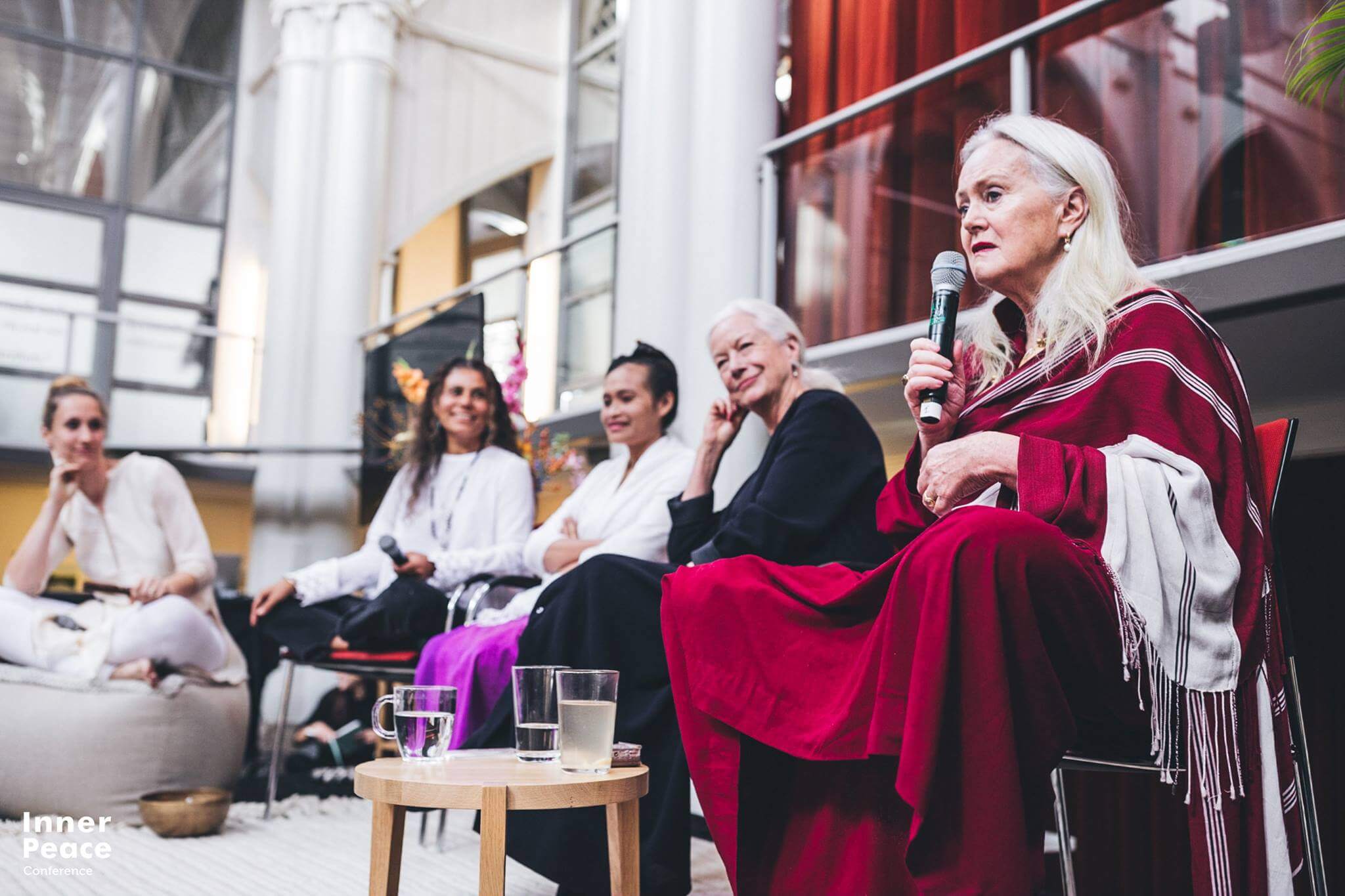
Afterward, Sofia said Allione fabricated a new version of the story, claiming she had heroically extracted a promise from him not to be violent even though he explicitly did not agree. “She told everyone, ‘Isn’t it so great what I did?’” Sofia said.
“They broke me, and once I was broken, they were willing to have a relationship with me,” Sofia said. “Once my spirit was broken, once I had completely submitted myself—like, ‘Whatever you want is right’—I stopped standing up for myself. Any positive, glowing aspect of me had been neutered.”
She described the three-month breakdown as a “hazing.” Only after she had been psychologically crushed did the community embrace her again. “I’ve been triggering you,” Allione told her—reframing her cruelty as a spiritual gift.
It was a teaching tactic, Sofia said, that Allione seemed to have inherited from her own guru, Chögyam Trungpa Rinpoche.
Devoted to a “Crazy Wisdom” Guru
In 1969, a 22-year-old Tsultrim Allione—then Joan Rousmanière Ewing—arrived at Samye Ling monastery in Scotland. The young abbot, Chögyam Trungpa, had just returned from the hospital after a serious car accident that left half his body paralyzed. (He had been driving drunk when he crashed into a storefront.)
Allione describes her first interview with Trungpa in Women of Wisdom: “I went into the room and sat timidly on the floor in front of his chair and looked at him. He did not say anything; nor did I. We stayed like that for about forty-five minutes.”
At the time she experienced her encounter as something “completely beyond words and form.” Later, she would frame it as mind-to-mind transmission—“an experience of space that extended outward without any reference back… so luminous and bliss-provoking… similar to, but beyond, sexual orgasm.”
Former staff say Allione spoke of Trungpa constantly; he was one of her pivotal teachers. While in Scotland, he gave her the Sadhana of Mahamudra, a text he wrote (or “channeled,” as she put it). She practiced it daily as she traveled overland from London to Kathmandu in a VW bus.
In 1970, in Bodhgaya, the site of the Buddha’s enlightenment, the 16th Karmapa ordained her as Karma Tsultrim Chödron. Over the next two years she practiced intensively in Nepal and India—meditating in caves above 16,000 feet and completing foundational practices.
Allione returned to the U.S. in 1972, spent three months at Trungpa’s Karmê Chöling in Vermont to finish Ngöndro, and then moved in literary-spiritual circles. She met Allen Ginsberg and traveled the West with him in 1972. Later, she traveled with Ginsberg and Ram Dass. In 1975 she began teaching meditation at Naropa University, where Ginsberg also studied with her.
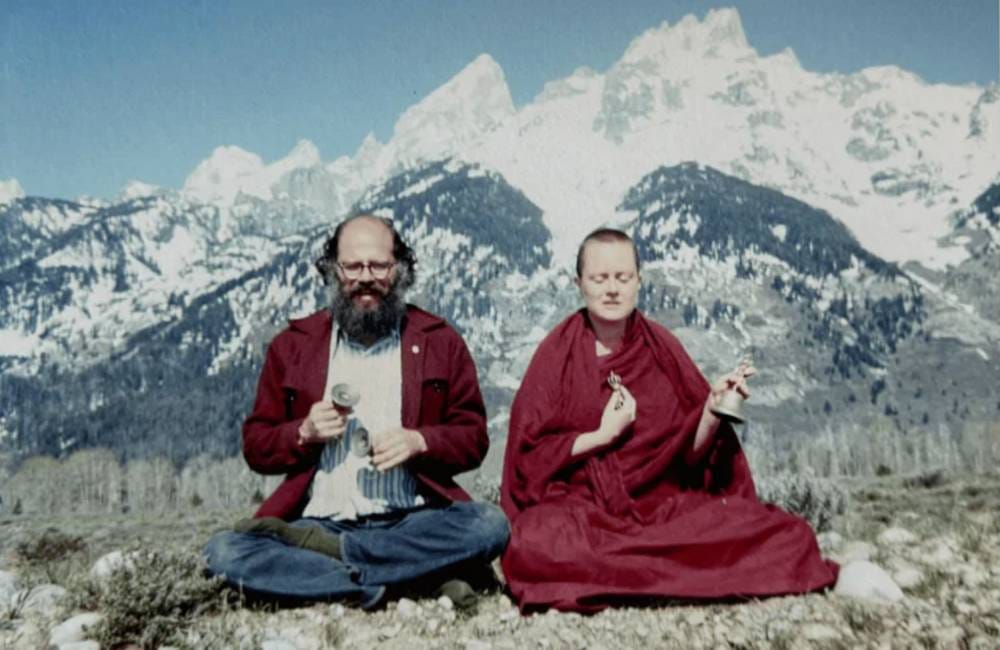
According to Sofia, at some point Trungpa also had sex with Allione. “It wasn’t a positive experience,” she said. “She alluded there was something bad about the way it happened, like he exerted his power over her.”
Other prominent Buddhist teachers, Joan Halifax and Tenzin Palmo, have alleged that Trungpa tried to sexually seduce them. When Trungpa was 30, he began dating Diana Mukpo, then 15; they soon married. He was also seen “passionately” kissing a 13-year-old in front of staff and teens, and, according to his ex-wife Leslie Hays, he demanded “women and girls at all hours of the day and night, some of them teenagers.”
The irony, former staff note, is that Allione herself once confronted a Tibetan lama who “came onto a very young and vulnerable 15-year-old” in her presence, writing to tell him “it’s not okay” and to consider his “impact on these women”—and was attacked for speaking up.
Despite the controversies, Allione continues to teach Trungpa’s practices and praises him in her public materials. Trungpa wrote the foreword to her 1982 book Women of Wisdom. Tara Mandala’s website states, “The method of shamatha taught at Tara Mandala is from Lama Tsultrim’s study and practice under Trungpa Rinpoche.” Like many teachers in Trungpa’s lineage, she built a tiered program of offerings; Feeding Your Demons® is a trademarked certification that costs $3,000.
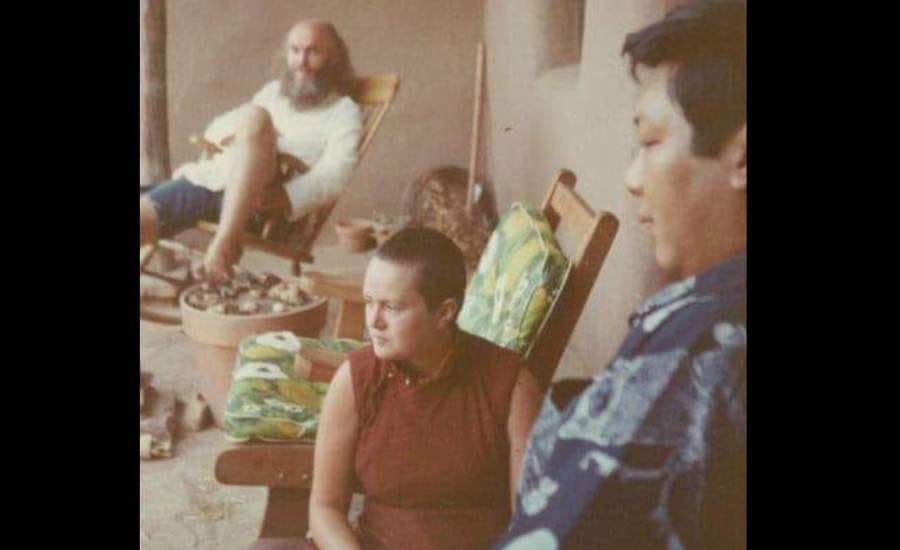
In 2007, Allione was publicly recognized as an “emanation” of Machig Labdrön, the famed Tibetan yogini whose teachings she draws on extensively in her programs and trainings.
Kathy explained that Allione's title as a "lama" was essentially purchased. "The person who declared her a lama was a very small, low-level lama who had a dilapidated monastery," Kathy recalled. "Allione and her followers donated money to his monastery, and he then said she should be a lama. No one had ever heard of him before." She said many people had felt "coerced into donating to his monastery." And then she came back and "declared herself a lama." Allione then invited him to Tara Mandala to inflate his importance.
Covering Up Abuse
When Sofia was 21, she says a visiting tulku, Sang-ngag Rinpoche, “drunkenly grabbed” her and kissed her on the lips. "It was not something I invited or wanted," Sofia said. "It had never occurred to me. I was incredibly uncomfortable."
She wrote to Allione about the incident but says the response was accusatory rather than protective. "He has a family," Tsultrim wrote to her. "What do you want to break up his family?" She said Allione called her a "home-wrecker" who had been "flirting with him."
Sang-ngag Rinpoche would still teach at Tara Mandala, however. "I had to feel super uncomfortable around him when he came to the land," Sofia said. "I couldn't enjoy his teachings anymore." While Tsultrim failed to protect her, others at the center told her she "should see this as a really big blessing" regarding the unwanted sexual contact.
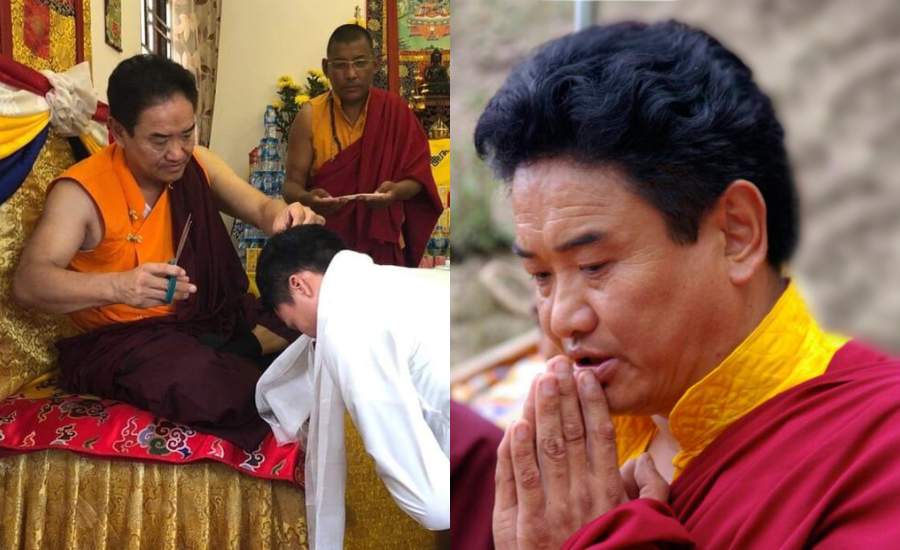
On a separate trip to Manali, India, Sofia says she was led to Sey Rinpoche’s bedroom by his assistant for what she thought was an interview. Instead, she recalls him asking, “You look tired—do you want to sleep with me or go back to your dorm?” Sofia said she was "totally shocked and blindsided" and never would have expected him to say this. She went back to her dorm as quickly as she could. The lama then glared at her for the remainder of the visit, she says.
Sofia reported the encounter to Allione, who, she says, replied, “You do have this ‘come-and-get-me’ way about you,” and advised her to stay quiet to avoid smearing the lama’s reputation. Sofia adds that Allione acknowledged hearing similar behavior about him regarding another woman. Despite that, she notes, Sey Rinpoche still appears in Allione’s biography. The message Sofia was given was to endure and remain silent, she said.
 The Guru MagazineBe Scofield
The Guru MagazineBe Scofield
An Untimely Death
David Petit, Allione’s husband, died in his sleep in the early hours of July 22, 2010. In public posts and biographies, Allione has said he died of a heart attack. Former insiders say no autopsy was performed and that he was cremated on the Tara Mandala property in less than 48 hours.
"He died in his sleep from a heart attack," Allione wrote in a Facebook post. "He was a great practitioner, so we don't need to worry about him."
Multiple former staff members recall that Allione blamed her followers, especially Clara, for his death. "On July 21, for a variety of reasons, the Protector’s Practices were not done, and David passed away from a heart attack in the early morning hours of July 22, 2010," Allione wrote.
"Tsultrim would bring this up about how we had killed her husband," Sofia said. “You know the last time we didn’t do the Protectors Practice, Dave died,” Sofia remembers her saying. "This was such an incredibly monstrous thing for her to do."
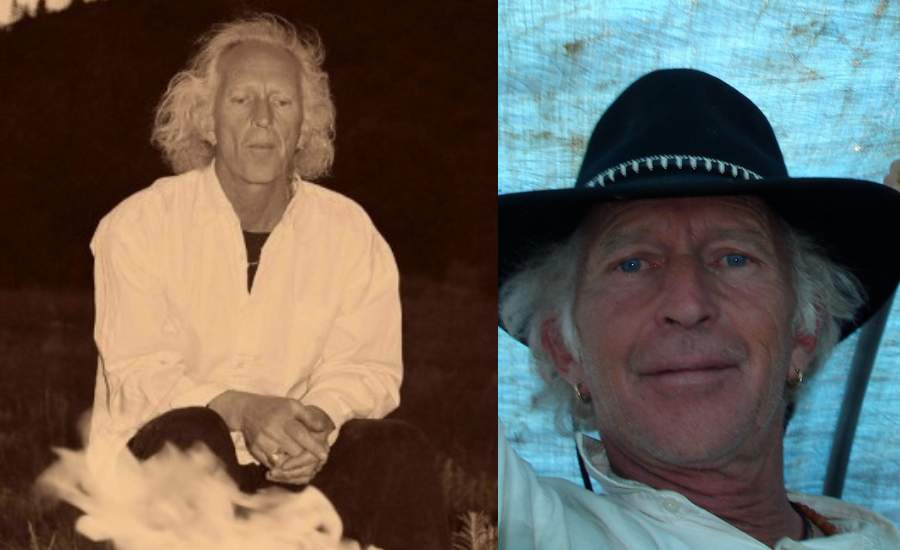
"Tsultrim gave a long monologue during a retreat about how David's death was the staff's fault," Sofia said. "It was really brutal. It was videotaped, but the person recording it found it so horrifying and incriminating to Tsultrim that she deleted the footage. But Tsultrim wanted her to post it online, and the staff member said, 'No, it will destroy you.'"
Sofia described David Petit as "spry and healthy" and noted that he was only 54 when he died. It was the nun Clara's job to ensure the daily Protector's Practice was done, but the night before he died, she didn't. "She completely blamed herself for him dying," Sofia said. "Tsultrim never let up on her," blaming Clara for his death.
Allione turned Petit's death into a mythological event. "He was proclaimed a great yogi by many lamas who knew his practice and the signs at the time of his death," Allione's biography states. "There were numerous rainbows every day after his death, as well as one of the rarest atmospheric phenomena, a moon bow, which, on the third day, extended from Ekajati Peak in the center of the land, to the house where David died...When the ceremony began, feather-like clouds started to dance in delicate, woven layers across the early morning sky." Allione said of it all, "What an incredible way to die—to inspire and to be held like that by your community."
She felt it necessary to highlight how "profound" and "ever-increasing" their love was right before he died. "In the last weeks, Lama Tsultrim and David had many particularly poignant and deeply felt times, with expression of profound and ever-increasing love," the Tara Mandala site states.
In reality, the two had been somewhat estranged. "She was sleeping in the temple that night," Kathy told me. "She hadn't spent much time around him that entire month. They weren't that close during that time."
"Some ex-followers believe David killed himself," Sofia told me. "I’ve seen her be ugly and mean to him before." Other former staff have seen her mistreat him as well. He apparently wanted out. "I was told David was miserable that she was emotionally abusive towards him," Sofia said. "He was financially trapped, and she was vindictive and nasty."
"A few days before he died, he told Lama Tsultrim that he felt his body was disappearing, dissolving," the website says.
Editor's note: There are several other female staff who endured years of abuse by Tsultrim Allione but are too afraid to speak out.

